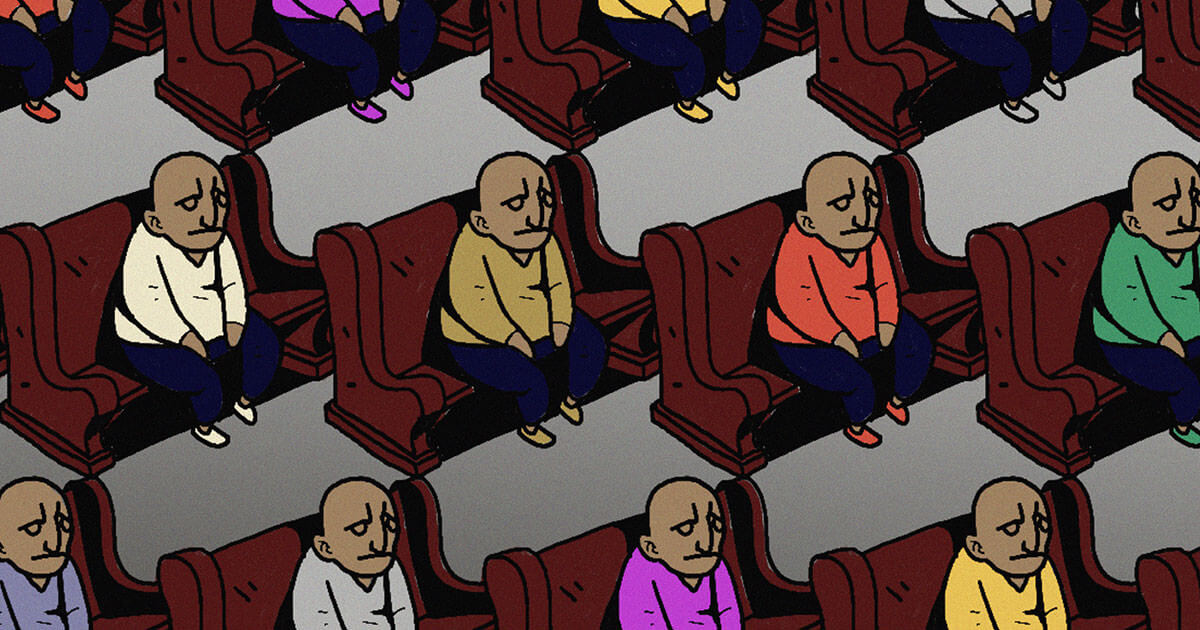
Recreating memory is often seen as a liberating phenomenon. Whether it’s expressed through songs, journal testimonies, or stories passed down across generations, memories can be powerful tools for families and close communities. But I am skeptical about its resonance for creating multicultural and caste-transcending communities in the Indian context.
For the 1.32 billion Indians in India, the whims and fancies of the caste system are inescapable. Caste dictates one’s destination — everything from birth to death. It determines the location of the village one ought to live in, the roles one can aspire to according to their assigned church hierarchies, the impossibility of ordination for the non-dominant caste Christians still prevalent in some Indian towns, the families in a church congregation with which one can have marital relations, the location of the cemetery where dominant and nondominant castes will be buried.
For the 24 million Indian Christians in India, the indignities of caste are traumatizing. Caste and church become realities of a mutual power relationship and as twins that are invested in violence — i.e. the violence of the denial of a fuller human life that is created in the fraternal image of God — that prevents an authentic life of love, community, and dignity for marginalized Christians.
It is in this context that the erasure of painful memory, sadly, is actually a strategy of resistance for us. Recovering memories can act as a force to deal with the oppressive realities, but it does not translate into salvific everyday life changes, especially in relation to the aggressive control wielded by caste-practicing Christians.
I am writing to evade memories as I have not been able to use memories liberatively in the face of psychic and at times physical violence, which is the status quo in the Indian Christian world. A few of these moments stay with me. The time my father and I visited the principal of a school, who was himself an evangelist on Sundays, for admission, he went on to lecture us, cleverly cloaking his caste rhetoric; the days and months I was made to sit on the floor during class 10 for flimsy reasons; being asked thrice to come down from the podium when I was the emcee of the event during an intercollegiate annual departmental event by a dominant-caste professor. These memories, unsurprisingly, happened in Christian institutions.
I do not believe that there is something essentially and purely Indian to be recovered for a liberative reason. The encounter with the Christian message within postcolonial modernity situates myself as a marginalized Christian in a role that enables defining my own self. My context has given me autonomy in relation to my memories and the values I choose to cherish, rather than self-identifying myself with my nation and referring to myself as Indian Christian.
I encounter continuous instances of psychic and physical violence instead of authentic Christian love and community, as found in the earliest Christian community in the book of Acts. This life of love is missing in the Indian subcontinent, and especially for Christians living at the bottom of the caste hierarchy. The absence of finding contemporary resonances of Acts-like, multicultural, multi-linguistic Christian communities prevents a liberative role for memory. The impossibility of a pan-caste society, living in harmony, can drive every community, including oppressed communities, toward caste pride that mimics dominant caste power dynamics.
Thereby, in contrast to those who employ the recovery of memories as a liberative strategy, for me, refusing to recover memories is liberating. I believe my contemporary Christian memories are liberating and I would not find recovering my Hindu ancestry as liberating. In the face of violence perpetrated against marginalized communities, the marginalized must recover sovereignty not in terms of caste or nationality, but God. I search for a self in God as a way to define my identity.
I avoid memory and prefer thinking of a universal ethos of identity rather than a particularist ethos of the Indian world, as the latter replicates and reminds of violence from forms of indignity both gruesome and casual. Using the term “Christian” to name my identity offers me a liberative understanding versus that of Indian or Indian Christian. Recognizing the universality of each human struggle and aspiration makes me wonder and dream of a world that can be universal — one that will be redeeming and does not force the categories of nation, caste, and class as markers of one’s identity. This conception of identity is similar to Paul’s idea in Romans 2, where he moves away from the particularism of Jewish identity (that of law or nation) and toward a universality found in God.
Not to be defined by the national is liberative for me and for most of my friends in my community. I believe the intertwined realities of neoliberal, capitalist, and dominant caste apparatuses continue to define and control the identity of marginalized communities. The national as a marker of identity benefits from the production of many identities and memories, only to appropriate them through the academy and the arts. Erecting one hegemonic identity becomes the desirable of all types of identities, as the one identity (Indian) makes all other identities peripheral.
Resisting memories is also about recovering identity to affirm the Christian practice of partaking in God’s inexhaustible self. What is at stake for me is the image of the divine mystery as the marker of identity. It is my fundamental belief that we the oppressed are not made in the image of the caste or the national, but that we reflect divine beauty and grandeur through our lives. But this reflection of the divinity gets decimated by the violence of caste. Divine mystery can be probed, questioned, and reflected via differences, but it cannot be defined. This is also not to fall for an abstraction that is found in the supremacist theologies that define God into a reality that does not offer solidarities. However, as I do not believe that caste is redeemable, resisting memory is a way to disrupt the viability of dominant caste-Christian norms.
Moreover, Indian churches are mirror images of Hindu temples in terms of moral and cultural ideology, human belonging, and co-existence. Brahminical-Hindu ideology has inspired churches to have separate pews for persons of dominant and nondominant castes, to construct different cemeteries for persons of the same church from different castes, and to murder couples when inter-caste Christian marriage happens. When psychic and existential violence becomes the inevitable character of the collective caste-Christian conscience, reclaiming the memories shaped through these encounters for marginalized Christians is an irony.
Thus, a person acts within the in-between space, of not being able to exist within the Indian ethos in a fully-human-enough-manner where the churches are situated as upholders of caste supremacy and implicated equally. In such a backdrop, memories must not be recovered as it presents a scenario of commodification of the lived experiences of the marginalized in the Indian subcontinent. Commodification happens when memories are translated into mere knowledge for knowledge’s sake and pity rather than community and belonging. Memories are commodified via art and academic production when hegemony is hand in glove with neoliberalism, capitalism, and caste apparatuses that control the memories of marginalized-as-fetishized-commodities. This is why the knowledge-production through controlled media, a tool of the oppressors, remains antithetical toward the aspirations of the self-constructions of the oppressed Christians in the Indian caste-continent.
Memory-making and memory-shaping thus become a resisting practice against the totalizing hegemonic state that wishes to appropriate the sweat and blood of the subaltern. It becomes a self-annihilating purpose, as expressed memories do not affect the structures of domination and material realities. By expressed memories, I mean poems, prose, liturgies, songs, social media posts, and artifacts of the marginalized. Memory recovery becomes a double burden, of experiencing the oppressions within one’s self and then striving for too long against all odds to reclaim something salvific.
I take the case of Kevin Joseph of Kerala as one of the defining moments in this decade for the minorities in India. Kevin Joseph and Neenu Chacko, hailing from Christian Dalit and Syrian Christian families respectively, perhaps did not realize that their “normal” human desire of falling in love would end in Kevin’s death. Theirs is a recent modern love tale that shocks the liberal Indian conscience not because Kerala is “liberal” nor even because of the murder itself, but because Kevin and Neenu transgressed the centuries-old caste diktat.
The unsurprising irony of this “modern” love story is the involvement of families — who were supposedly connected to progressive ideologies and advocacy — that perpetrated violence. Kevin’s murder was the handiwork of the girl’s family — a Syrian Christian family whose kith and kin are Christians, Muslims, and Communists — who were complicit in the “honor killing”. Kevin’s “honor killing” brings up the norms of purity maintained through marriage and reinforcing these purity norms, and the possibility of death and violence in a modern liberal space.
If such violence is possible in one of the most liberal and educated states in India with the help of the dominant caste groups’ appropriation of Christian, Left, and Muslim ideologies, the hope for memory is a paradox for the oppressed. Memories of Kevin’s family can resist the dominant narratives, but how far will it go to change the caste super-structure of inequality remains a question for generations to come. In this scenario, I do not see the hopes of claiming the Indian-Christian identity as liberative.
Play-acting the role of an Indian Christian, when the Indian ethos does not offer a space for exercising our rights and responsibilities, is intellectual suicide. The recognition of humanity and human dignity of marginalized communities can only be found in the image of God’s divine mystery. Dignity cannot be found within the state, nation, and caste, for they offer an oppressive rationale for identity and rarely the freedom that God offers in our quest for a life of autonomy and sovereignty.

John Enger Cheng serves as creative director of Inheritance. He is a Los Angeles-based artist, designer and illustrator. He graduated from the University of Southern California Roski School of Fine Arts and is co-founder of Winnow+Glean. You can see his illustrative work and store at madebyenger.com.
